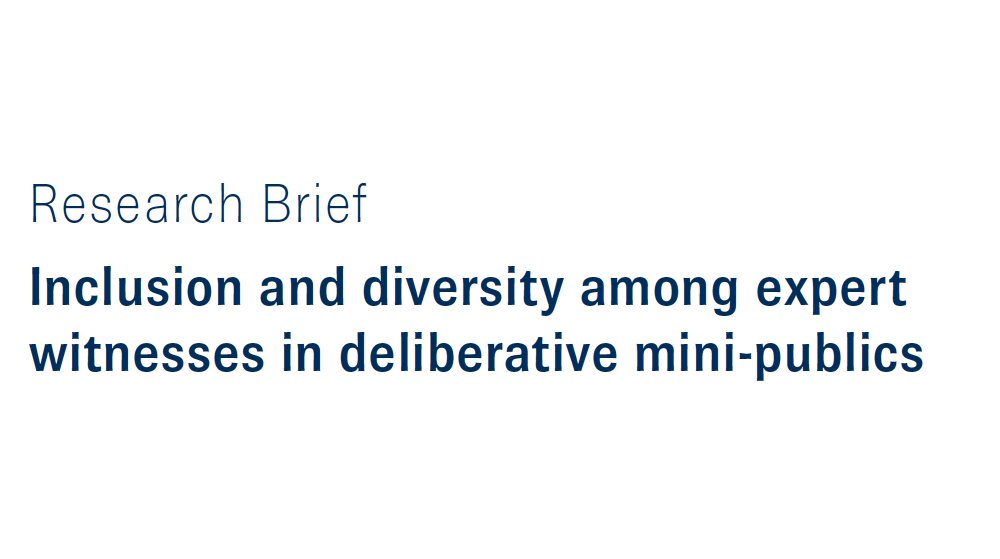
🎈📢New research brief📢🎈
Democratic innovations like #ClimateAssemblies should be equitable and accessible, right? Right!
What about for the experts that give evidence to the participants?
We looked at this:
Thread 🧵👇🏽👀
Democratic innovations like #ClimateAssemblies should be equitable and accessible, right? Right!
What about for the experts that give evidence to the participants?
We looked at this:
Thread 🧵👇🏽👀

[2/14] We set out to examine:
1⃣ Diversity and inclusion amongst the experts informing the citizen deliberations on climate action.
2⃣Approaches to ensuring that participants hear from experts with a diversity of identities and experiences.
1⃣ Diversity and inclusion amongst the experts informing the citizen deliberations on climate action.
2⃣Approaches to ensuring that participants hear from experts with a diversity of identities and experiences.
[3/14] We studied published reports from 23 citizen deliberations on climate action (Climate Assemblies, Citizen Panels, and Citizen Juries) held between 2019 - 2022 in the UK, looking for information about expert diversity and inclusion 🏳️🌈🦻🏿🧑🏽🦯👩🏽🦼👩🏽🦽🦾🧕🏼👳🏿♂️🏳️⚧️
[4/14] But we couldn’t find anything.
Nothing. At. All 🤷🏽♀️🔎
The reports emphasise transparency and inclusion to ensure representation among citizen participants (which is important!). But the process is opaque for those involved as experts, and other roles, too.
Nothing. At. All 🤷🏽♀️🔎
The reports emphasise transparency and inclusion to ensure representation among citizen participants (which is important!). But the process is opaque for those involved as experts, and other roles, too.
[5/14] *None* of the reports we studied:
a) include #EDI targets or measures supporting participation of experts from minority or marginalised demographics or identities
b) give a transparent account of the process of identifying and selecting experts, or other such roles
😲
a) include #EDI targets or measures supporting participation of experts from minority or marginalised demographics or identities
b) give a transparent account of the process of identifying and selecting experts, or other such roles
😲
[6/14] Our findings present a call to action: organisers and governing bodies of deliberative processes must resource and implement transparent and inclusive processes for expert involvement.
[7/14] How? Embedding inclusion principles throughout the design and delivery of deliberative processes requires commitment and action from all roles, including the commissioning body, those in in governance roles, the organisers, the experts, and the wider public.
[8/14] We lay out 16 recommendations for what action should be taken by who, with three overarching messages:
[9/14]
Action 1⃣: The processes of identification and recruitment for all roles should be transparent and reported.
Action 1⃣: The processes of identification and recruitment for all roles should be transparent and reported.
[10/14]
Action 2⃣: Targets for equity, diversity, and inclusion for all roles should be set, demographic information collected and reported (while safeguarding anonymity).
Action 2⃣: Targets for equity, diversity, and inclusion for all roles should be set, demographic information collected and reported (while safeguarding anonymity).
[11/14]
Action 3⃣: Barriers to expert participation should be clearly identified and reported and sufficient measures taken to mitigate these barriers and to ensure an inclusive environment for witnesses.
Action 3⃣: Barriers to expert participation should be clearly identified and reported and sufficient measures taken to mitigate these barriers and to ensure an inclusive environment for witnesses.
[12/14] Why does this matter?
1⃣democratic processes should be equitable & accessible for all
2⃣ underrepresented & marginalised voices must be included & elevated for #ClimateJustice
3⃣expert diversity will influence perceived legitimacy of the process and its outcomes
1⃣democratic processes should be equitable & accessible for all
2⃣ underrepresented & marginalised voices must be included & elevated for #ClimateJustice
3⃣expert diversity will influence perceived legitimacy of the process and its outcomes
[13/14] Want to know more? See our page brief. We hope a research publication will follow – but we want to share our findings right away. pureportal.strath.ac.uk/en/publication…
@StrathclydeOA
@StrathclydeOA
[14/14] The research team included @hannahpsalamon @RuthLightbody @stefanie_reher @marcoreggiani_ @Pirie_Clara
Thanks to NERC @NERCscience for funding the research through the Discipline Hopping initiative, and Glasgow Caledonian @CaledonianNews for supporting early scoping.
Thanks to NERC @NERCscience for funding the research through the Discipline Hopping initiative, and Glasgow Caledonian @CaledonianNews for supporting early scoping.
• • •
Missing some Tweet in this thread? You can try to
force a refresh




